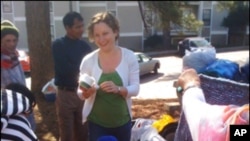Sixty years ago this month, the United Nations Convention relating to the Status of Refugees, better known as the Refugee Convention, began the ratification process. It, and the UN Convention on the Reduction of Statelessness, which followed a decade later, “Laid a marker for human compassion on a global scale,” said Secretary of State Hillary Clinton.
Speaking at the United Nations High Commissioner for Refugees Ministerial commemorating these two anniversaries Secretary Clinton said that half a century later, “the scale of the challenge has expanded in ways that no one foresaw:”
"Tens of millions of desperate people have fled conflicts and crises in a steady flow. Their numbers and populations have grown so increasingly mobile that they now are viewed as a fluid but permanent presence. Millions continue to be uprooted by wars or victims of persecution because of race, tribe, religion, political opinion, or sexual identity. Many are internally displaced persons, disempowered within their own countries.”
“My country is a nation of immigrants, and we are proud to have welcomed so many refugees to our shores,” said Secretary Clinton. “This year alone, we welcomed more than 56,000 refugees from more than 60 countries. And we are equally proud to be UNHCR’s largest financial donor. We support this work, we understand its importance, and we honor those who do it,” she said.
Whether it be better training for personnel dealing with immigrants; providing counseling for refugees, or civic education to young people so they might learn democratic practices; or concentrate on helping girls, women, and children, who are especially vulnerable to violence and sexual exploitation; the global community must find and employ the best, most innovative policies to protect and aid people in need.
“If we do what is necessary today, we can alleviate a lot of the suffering,” said Secretary Clinton. “The benefits of doing so are clear and extend beyond resolving the crisis of the moment. We won’t only help people return home in safety and with dignity, but begin new lives in resettlement countries.”
Clinton On Anniversary Of Refugee Convention

Sixty years ago this month, the United Nations Convention relating to the Status of Refugees began the ratification process.



